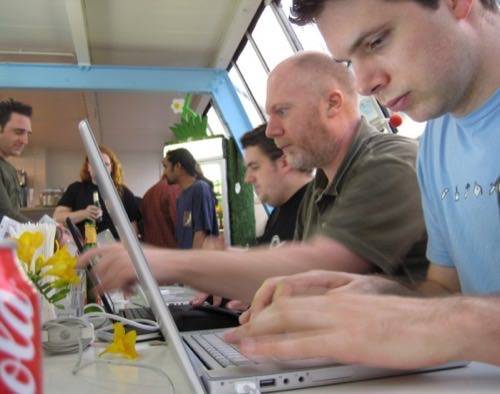
Guest author Scott Gerber is the founder of the Young Entrepreneur Council.
You may have to alter your leadership style to manage software developers, who don’t necessarily thrive with the same management structure nontechnical talent does. Most important of all? Setting clear expectations upfront—and anticipating differences in work habit before they become an issue.
We asked 11 entrepreneurs from Young Entrepreneur Council (YEC) to share some of the biggest leadership mistakes they see when it comes to managing developers and tips for avoiding the same mistakes. Their best answers are below.
Assuming They Will Speak Up
Don’t assume that software developers will speak up about their challenges, ideas or even triumphs. Many developers are reluctant to share this information during team meetings. You have to solicit open, honest feedback on a regular basis.
Being appreciated for one’s efforts contributes to employee morale and retention. So we ask questions like, “What’s going well in your role? Any wins—big or small—this week?”
It is also far better to learn about an issue before it becomes a nightmare problem. We ask, “Are there any obstacles you are facing and how can I help?”
Finally, asking questions is a great way to expose the ideas lurking inside the brilliant minds of your development team. We ask them to provide one idea to improve our product or the company each week.
Assuming Developers Want To Work The Same Schedule As Everyone Else
It’s important to be flexible and allow developers to work during their most natural productive and undisturbed times. In some cases that may be coming in late and working in the evenings. Don’t force creative people to come in at 8 a.m. just because everyone on your business development team is in the office at that time.
Not Showing Trust
Founders are often developers themselves who have graduated to taking on the role of leading a company. A common mistake is not letting go of the developer decisions and trusting your developers and tech talent. Delegating and trusting your developers is crucial for allowing you to focus on the bigger picture, and allowing them to take on more responsibilities and grow.
Not Managing Distractions
Distractions are the bane of any developer. It’s important to keep an eye on potential external distractions that can keep your developers from staying focused. Manage those distractions actively so you can keep them from interrupting your developers.
Sometimes distractions are generated by the developers themselves, which is a huge red flag. If your developers can’t keep themselves focused, it’s time to find new developers.
Believing False Deadlines
Developers are notorious for promising rosy, false deadlines. Double or triple their timeline. Double or triple the budget, also. Now you’re in the ballpark.
Plan your launch and promotion around this timeline. If development finishes sooner your customers and stakeholders will be ecstatic. You’ve hedged your bets so you’re not behind.
—Joshua Lee, Standout Authority
Not Playing to Their Strengths and Experiences
It’s important to understand your team’s talents before you begin any project so you can assign the right task to the right person. Team members need to remain engaged throughout the project, which can be difficult to achieve if their assignments don’t align with their experience and dispositions.
Jyot Singh, RTS Labs
Not Focusing on Detailed Requirements
A lack of detailed requirements is a big problem when it comes to development. Most founders who don’t have project management or development experience try to paint a broad picture of what they think their website or app should look like, hoping that developers will have the same vision.
Unfortunately, it never happens that way. Developers rarely have the exact same vision, so they’re unlikely to deliver what you are expecting unless you provide exact details.
In order to save a lot of time and aggravation, I recommend taking time to imagine exactly how your website should look and work, write it all out on paper and then ask your development team to go over it with you in order to make sure that everything is clear.
—Vladimir Gendelman, Company Folders, Inc
Not Listening to Technical Expertise
Hire great technical talent and then listen to them! So many leaders think they know best, even in domains where they might not be so experienced. Don’t make the mistake of undermining your technical talent by not listening to their opinion. Present them with the problem and let them work out their own solution.
Managing Based on Whims
The first mistake is thinking that your developers are mind readers. The second mistake is believing that you can just throw any new app feature idea at them and expect them to add it to “the package.”
Communicate every feature detail very clearly and show them (by rough sketches if necessary) how you think the product should work. Then stick to the plan until the first version is out.
The worst thing you can do is to throw them with a vague idea(s), tell them to build it and tell them it’s nothing like you expected after it’s finished. Talk about waste of time and money (for both you and your new hire)! Also, get out of their way when they are creating. You hired them for the role for a reason. Let them show you why.
—Juha Liikala, Stripped Bare Media
Assuming They Can Solve Every Problem
Especially if you, the founder/CEO, aren’t so tech-savvy, you can’t expect the IT person to resolve every single issue that arises. Some tech talents actually make magic, but sometimes that magic has limits. It’s good to keep in mind what you need to do and why, and then how, you can do it.
Not Understanding the Developer’s Personality
In my experience, there are two types of developers: executors (who want every little thing mapped out before they begin programming) and creatives (who want some leeway to figure out what is best from a tech standpoint).
The executors have no interest in their own opinion on how things should look or flow; they take pride in taking an idea and making it real. The creatives want to be a part of the brainstorming and planning process.
It’s easy to work with both. For the executors, ask exactly what they need to do the job and give it to them. You will save hours of time on development by listening. For the creative types, involve them early in the idea process. They will be more passionate and thus effective.
Photo by Phil Whitehouse

















